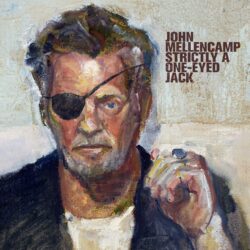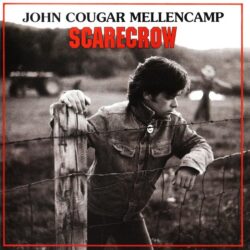
Johnny Cougar, John Cougar, John Cougar Mellencamp, John Mellencamp; the professional name has varied over the years, but whatever you call him, John Mellencamp (birth name) has had a long, varied and very successful career, reputedly shifting more than 60 million albums. That said, he’s still probably best known for the hit single ‘Jack & Diane’ in 1982 which reached the summit of the US Billboard Hot 100 and #25 in the UK singles chart, it was a song from the “American Fool” LP.
From the early 1980s to 1991, Mellencamp released a series of five consecutive albums of consistently great quality; from 1983’s “Uh-huh“, through “Scarecrow” (1985), “The Lonesome Jubilee” (1987), “Big Daddy” (1989) to 1991’s “Whenever We Wanted“. Mellencamp was an angry young man with something to say; the records were populated by good songs, well performed by a great band of musicians and exceptionally well recorded. Other albums dotted around Mellencamp’s extensive career have also been notably good, such as 1998’s excellent “John Mellencamp“, but some have been notably bad too, 1994’s “Dance Naked” being a case in point; however the album I have a real problem is from a much later period.
 Can’t Live With it. “Strictly a One-Eyed Jack” (2022) was a bit of a comeback album after a five year hiatus since 2017’s “Sad Clowns & Hillbillies“, his previous studio album of original material (discounting 2018’s compilation of cover versions “Other People’s Stuff“). Sadly, it’s such a disappointing release; deeply uninspiring. Mellencamp was 70 years old at its release, and it shows; giving the impression of being the work of an aging artist who has settled for pipe and slippers, or put the cue on the rack (pick your cliché of choice). Where is the anger, the spirit, or the energy that was evident earlier in Mellencamp’s career?
Can’t Live With it. “Strictly a One-Eyed Jack” (2022) was a bit of a comeback album after a five year hiatus since 2017’s “Sad Clowns & Hillbillies“, his previous studio album of original material (discounting 2018’s compilation of cover versions “Other People’s Stuff“). Sadly, it’s such a disappointing release; deeply uninspiring. Mellencamp was 70 years old at its release, and it shows; giving the impression of being the work of an aging artist who has settled for pipe and slippers, or put the cue on the rack (pick your cliché of choice). Where is the anger, the spirit, or the energy that was evident earlier in Mellencamp’s career?
The record’s opener ‘I Always Lie to Strangers‘ sets the tone; slow (it proceeds at a funereal pace), with gruff vocals, it’s so difficult to get into. Hot on its heels is by ‘Driving in the Rain‘ which is slightly faster and has a nice guitar solo courtesy of Andy York but has little else of merit as Mellencamp croons his way through the song, although the melody at times borrows from Mellencamp’s song ‘Key West Intermezzo (I Saw You First)‘ from 1996’s “Mr. Happy Go Lucky“. ‘Sweet Honey Brown‘, basically a love song to heroin is a better listen, but by the time we hear this song, we’re almost halfway through the album.
Then we come on to what is probably the best song on the album, ‘Did You Say Such a Thing‘; uptempo and catchy, it features Bruce Springsteen on guitar and vocals, one of three involvements which lift the songs on which he appears. ‘Did You Say Such a Thing‘ sounds like it could have appeared on Mellencamp’s 1998 eponymous album. Next up, though is ‘Gone Too Soon‘, and listening to this, if someone had told me I was listening to Louis Armstrong, then I would believe them; Mellencamp sounding unrecognisable from how he did in his heyday, and doing a more than passable impression of ‘Satchmo’; this feeling is supported by the trumpet solo, which in itself is good, but a far cry from the trumpet solo on ‘Love and Happiness‘ from “Whenever We Wanted“, where the trumpet literally spits from the speakers with such ferocity that you feel pinned back in your seat.
‘Wasted Days‘, one of the album’s singles, again features Springsteen and benefits greatly from this; it’s another highlight with The Boss’ involvement seemingly inspiring Mellencamp to raise his game vocally. The LP concludes with the third involvement of Springsteen, just playing guitar this time, on ‘A Life Full of Rain‘. There are far too many songs on this record that can be described as plodders; the high spots are the three songs on which Springsteen puts in an appearance.
The sleeve indicates that the record was “Produced by Mellencamp a/k/a Little Bastard” (a pseudonym that Mellencamp uses for production work, it’s also the nickname of the legendary Porsche 550 Spyder that James Dean was driving when he died). All the songs on the record were written by Mellencamp and, as per usual, recording took place at his own Belmont Mall Studio. The album’s cover, a portrait of Mellencamp, was painted by Mellencamp’s son Speck, who is currently executive director of Southern Indiana Center for the Arts.
The good thing is that 2023’s “Orpheus Descending” is a much, much better effort than “Strictly a One-Eyed Jack“; sure, Mellencamp’s voice now displays all the signs of being ravaged by age and a lifestyle not entirely suited to vocal preservation, but the songs are at a different level than those on “Strictly a One-Eyed Jack“.
 Can’t Live Without it. “Scarecrow“ (1985) was recorded over the course of around one month, from late March to late April 1985; it is Mellencamp’s eighth studio album. Produced by Little Bastard and Don Gehman (Stephen Stills, Hootie & The Blowfish, The Goo Goo Dolls, R.E.M., Jimmy Barnes, Pat Benatar); it was Mellencamp’s first album to be recorded at Belmont Mall Studio.
Can’t Live Without it. “Scarecrow“ (1985) was recorded over the course of around one month, from late March to late April 1985; it is Mellencamp’s eighth studio album. Produced by Little Bastard and Don Gehman (Stephen Stills, Hootie & The Blowfish, The Goo Goo Dolls, R.E.M., Jimmy Barnes, Pat Benatar); it was Mellencamp’s first album to be recorded at Belmont Mall Studio.
‘Rain on the Scarecrow‘ opens proceedings in powerful fashion, both musically and lyrically. Against the twin guitar attack of Mike Wanchic and Andy York and the pounding drums of Kenny Aronoff, Mellencamp sings “Four hundred empty acres that used to be my farm, I grew up like my daddy did, My grandpa cleared this land, When I was five I walked the fence while grandpa held my hand“. And “The crops we grew last summer weren’t enough to pay the loans, Couldn’t buy the seed to plant this spring and the Farmers Bank foreclosed“. It’s a song about the loss of family farms across the USA. Mellencamp became one of the founders of Farm Aid, an organisation that began in 1985 with a concert in Champaign, Illinois to raise awareness about the loss of family farms and to raise funds in aid of America’s under pressure family farmers with the objective of keeping family farmers on their land. Mellencamp is still involved and regularly performs at Farm Aid concerts.
Next song is here is sung by Mellencamp’s grandma Laura Mellencamp, it’s listed as ‘Grandma’s Theme‘ although the song is actually part of a song called ‘In The Baggage Coach Ahead‘ written by Gussie L. Davis in 1896 and first performed by Imogene Comer the same year. Smash hit single ‘Small Town‘ (one of seven singles from the LP; their releases spanning 1985 and 1986). ‘Small Town‘ hit #6 in the Billboard Hot 100 but only #53 in the UK singles chart.
The general theme of the record is around the ‘reality’ of American life and the way it is changing; ‘Minutes to Memories‘ is about older folk passing on their knowledge, wisdom and how life used to be, to younger folks. Then, on ‘The Face of the Nation’ Mellencamp sings “And the face of the nation, Keeps changin’ and changin’, the face of the nation, I don’t recognise it no more“.
‘Between a Laugh and a Tear‘ is the standout cut for me on this record; with Rickie Lee Jones providing harmony vocals, it opens with “When paradise is no longer fit for you to live in, And your adolescent dreams are gone“. ‘Rumbleseat‘ and ‘R.O.C.K. in the USA‘ have an old fashioned sound to them; they are just straightforward rock and roll songs.
“Scarecrow” was the subject of a reissue in 2022, including the release of a really nice Super Deluxe edition, comprising of a remixed and remastered LP version of the record, a seven-inch single of ‘Small Town‘, backed with an acoustic version of the same song, two CDs including the album and a bunch of unreleased tracks (non-album tracks, demo versions, etc.), a Blu-ray audio disc of the CD content in high resolution audio, a booklet, a poster and some photographic prints. One can form one’s own view on the merits of the remix/remaster, but it’s good to have the previously unreleased tracks available.



John’s ‘can’t live without it’ for me would be Big Daddy, his largely unsung and forgotten follow-up to Lonesome Jubilee. It’s chock full of excellent songs, and I never tire of it. Agree about SAOEJ though.
Nice analysis of some of Mellencamp’s work. The Lonesome Jubilee is my favourite album of all time, and I regularly bang on about it to anybody who will listen. I’m amazed it never features near the top of the many “Greatest Americana Albums of All Time” articles.
One more point: Andy York didn’t play guitar on Scarecrow. It was Larry Crane. Andy York didn’t join the band until the 90s.
Hi Rob,
Thank you for your comment, and for pointing out my error; you’re quite correct, Andy York’s first appearance was, I think, “Dance Naked”.
“The Lonesome Jubilee” is great; I think one could make a case for any of those five albums between 1983 and 1991 as being the album that one couldn’t live without.
That was what I was thinking too….Larry Crane was the guitarist when Mellencamp was making all the big hits. Some say that Larry Crane defined the Midwest sound. Just look at his solo career. Pretty impressive
Hi Jed,
Thanks for taking the time to read the article, and for your comment.
“Big Daddy” is a great record too.
After starting as Johnny Cougar, he reclaimed his own name and has never looked back – an uncompromising SOB, the best kind.
Interesting article, many thanks.
“Lonesome Jubilee” just edges out “Scarecrow” for me, largely because of the instrumentation and arrangements. I bought the remastered “Scarecrow” and find it somewhat lacking, and the sheer thump of “Rain On The Scarecrow” seems to have been dialled down.
I’m afraid I still have a lot of love for “Jack And Diane” too, though I can convince myself my Americana principles are intact by finding my favourite version being that on “Unplugged” (I think) where it’s rearranged with fiddle and acoustic guitar to the fore.
For long term fans who haven’t invested, John’s On the Rural Route 7609 boxset is as good as it gets. 4 CDs’ worth of more obscure album tracks, demos and rarities culled from his later albums, it’s a non-chronological but thematic overview which works very well. The closing track is an unreleased version of the title song, far better than the album version and intensely chilling. Worth shelling out for even if you have all the albums already.
That’s a really good shout.
Good to have the opportunity to highlight Mellencamp’s body of work. Agree about his purple patch being mid to late 80s. Whenever we wanted was basically a more straightforward rock record after the more downbeat (but better) Big Daddy record. Lonesome Jubilee has long been a favourite but Scarecrow is still probably his classic recording. Haven’t been over-excited about his more recent releases post 90s. Although Longest Days is a terrific song.
On The Rural Route 7609 is a fine set NOT a best of. It would have been easy just to repeat Jubilee but JM always tried new sounds not always successfully.